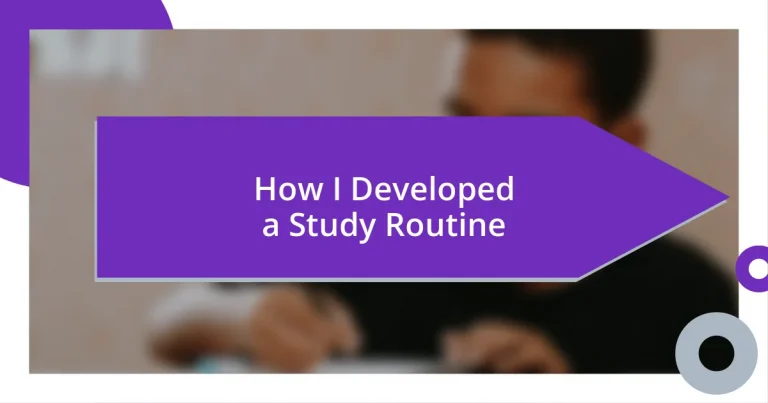Key takeaways:
- Establishing a consistent study routine enhances focus, productivity, and a sense of control over time.
- Analyzing personal habits, including study timing and environment, is crucial for optimizing learning and retention.
- Regular evaluation and adjustment of study goals and methods ensure that the routine remains effective and engaging.
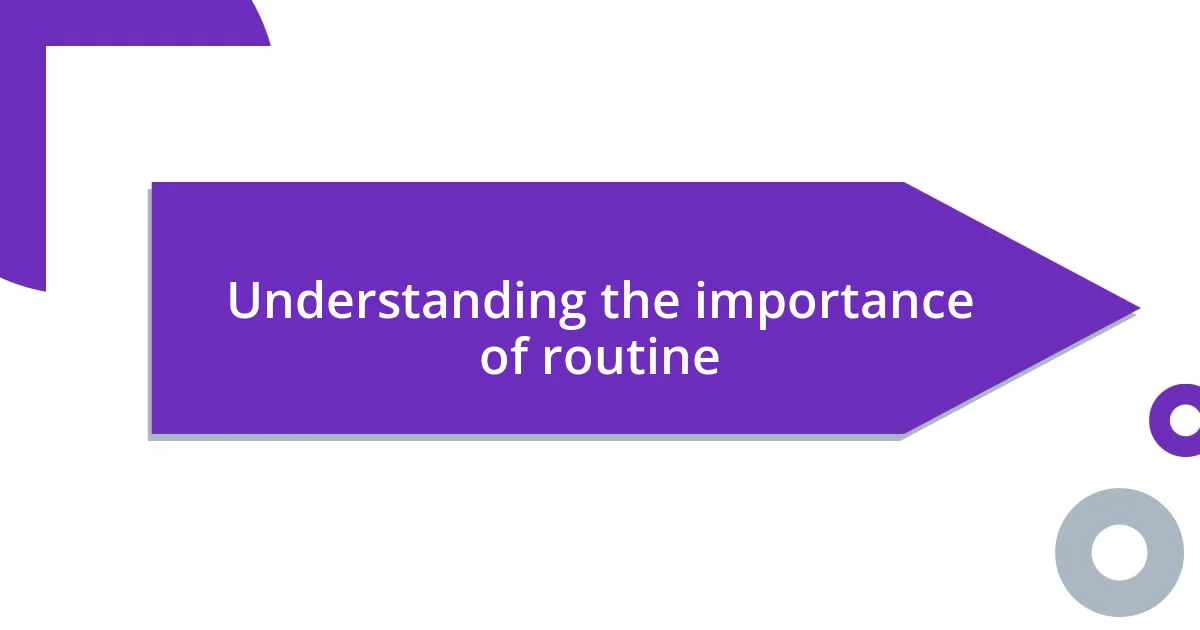
Understanding the importance of routine
Establishing a routine is like setting a solid foundation for a house. When I committed to a daily study schedule, I felt an immediate sense of control over my time. I began to realize that routines don’t confine us; they liberate us to focus on what truly matters.
One time, I overlooked my routine during a busy week and tried to wing it. The result? I felt scattered and less productive, which was incredibly frustrating. It made me question where my time had gone and reinforced how vital a consistent routine is for maintaining a sense of purpose.
Think about it: how often do we aimlessly drift through our day without direction? I used to do that, and it led to endless distractions. But once I carved out specific time blocks for studying, I found that I could dive deeply into my subjects, retaining the information better and feeling genuinely accomplished.
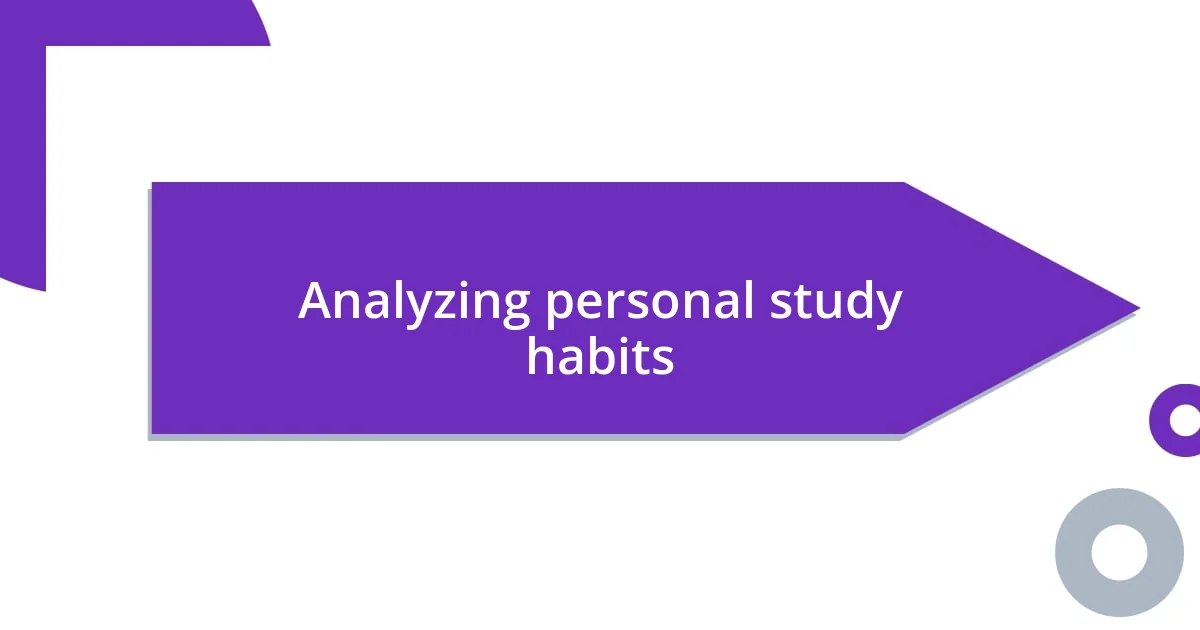
Analyzing personal study habits
Analyzing personal study habits is crucial for optimizing my learning experience. I noticed that studying in the morning when my mind was fresh greatly enhanced my retention. On days when I tried to study late at night, I’d often feel sluggish and struggle to absorb information. Reflecting on that, it became clear that aligning study sessions with my natural energy levels significantly improved my productivity.
Another aspect I’ve had to dissect is the environment where I study. Initially, I often found myself on the couch or at a noisy café, which led to frequent distractions. After some trial and error, I settled on a dedicated study space—quiet, organized, and free from interruptions. This shift drastically increased my focus and made studying feel more intentional and enjoyable.
I’ve also found that mixing up my study methods keeps the process vibrant and engaging. While I once relied heavily on reading, incorporating flashcards and group discussions sparked new interest in my subjects. I remember one particular study session where I explained a topic to a friend; the act of teaching not only helped my friend but reinforced my understanding. This engagement has become a key part of my study habits.
| Study Habit | Description |
|---|---|
| Time of Day | Morning sessions lead to better focus and retention. |
| Study Environment | A quiet, organized space minimizes distractions. |
| Study Methods | Mixing techniques like flashcards and discussions keeps learning engaging. |
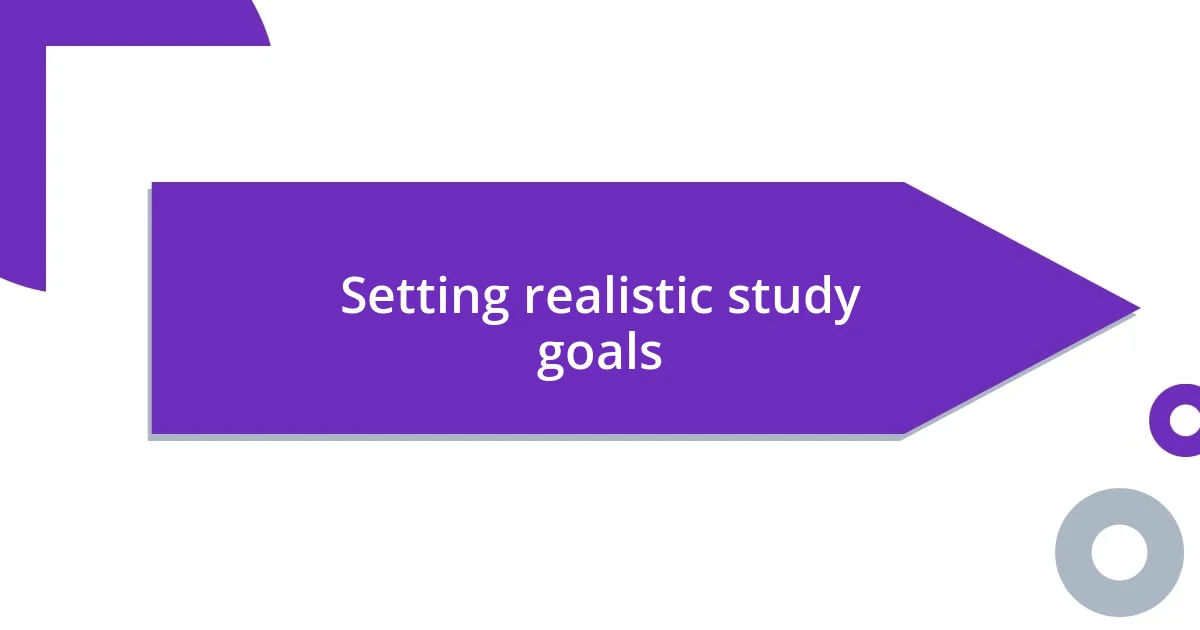
Setting realistic study goals
Setting realistic study goals has been a game-changer in my academic journey. Initially, I set targets that were too ambitious—like planning to cover an entire textbook in a week. The stress that followed was overwhelming, leaving me feeling defeated and disheartened. I learned that it’s not just about the amount of content I aim to cover, but rather about what I can genuinely absorb in a given timeframe. By breaking tasks into smaller, achievable goals, I felt a noticeable boost in my motivation.
Some practical tips for setting realistic study goals include:
- Prioritize Tasks: Focus on the subjects or topics that need the most attention and tackle them first.
- Be Specific: Instead of saying “study math,” specify “complete chapter 5 exercises” to keep your focus laser-sharp.
- Set Time Limits: Allocate specific time blocks for each task to create a structured approach without burnout.
- Celebrate Small Wins: Acknowledge your progress, no matter how small. It fuels motivation and keeps you engaged.
- Adjust as Needed: Regularly review your goals and adjust them based on your progress and any unforeseen challenges.
I’ll never forget the week I decided to tackle just two chapters of my toughest subject—rather than trying to hit three. I found myself genuinely understanding the material rather than merely glossing over it. That feeling of comprehension over quantity was liberating. Establishing realistic goals allowed me to savor learning, transforming what could feel like a chore into a rewarding experience.
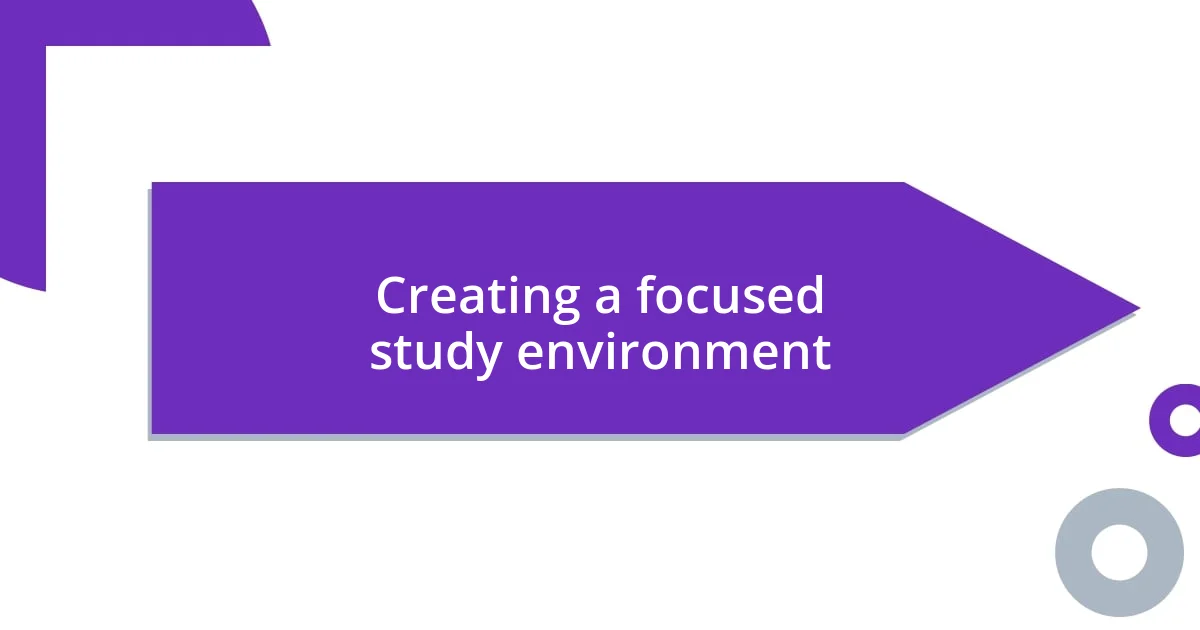
Creating a focused study environment
Creating a focused study environment has been one of the most essential aspects of my learning process. I remember when I used to study on my bed, surrounded by pillows and blankets—it never worked well. I realized that my brain associated that cozy space with relaxation, making it hard to switch into study mode. Now, I’ve found that having a specific desk with good lighting and minimal clutter instantly signals to my mind that it’s time to focus.
Surprisingly, I also discovered how temperature plays a role in my concentration. On particularly hot days, I struggled to focus, as the heat made me sluggish. I invested in a fan, and instantly, the improvement was noticeable. A cool environment keeps me alert and engaged. Have you ever noticed how your surroundings affect your focus? I began to think of my study environment as not just a physical space, but as an environment that nurtures my learning process.
Lastly, the addition of background music has been transformative for me. Soft instrumental tracks create a soothing atmosphere without being intrusive. I remember a study session where I played piano music; it felt like my thoughts flowed more freely, and I could absorb information better. Finding that sweet spot where the environment enhances rather than detracts from my studies has made a world of difference. What little changes have you made in your own study space that led to noticeable improvements?
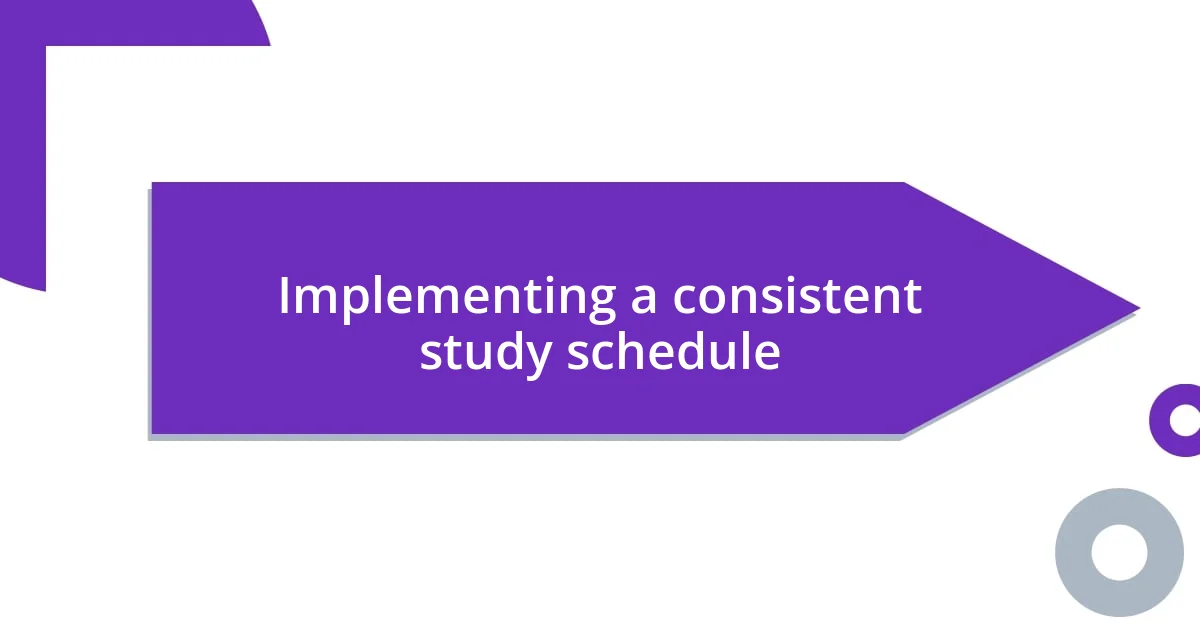
Implementing a consistent study schedule
Implementing a consistent study schedule changed everything for me. At first, I thought studying whenever I felt like it would work, but I soon realized that my productivity fluctuated wildly. That’s when I decided to set a specific study time each day. Having a routine helped me create a rhythm; it was like training my brain to expect focus time. When I settled into that routine, I noticed I was much more engaged and less anxious about my studies.
I remember the first week I committed to studying every morning at 7 am. Initially, it was tough; waking up early wasn’t my cup of tea. But after a few days, my body began to adjust, and I found that the quiet morning hours were actually my most productive time. I look back on it fondly; it felt like reclaiming a piece of my day just for myself. Do you ever wonder how a simple change in timing can make such a difference? For me, it was a revelation—two hours each morning made all the difference in my retention and understanding of the material.
To ensure adherence to this schedule, I incorporated a few strategies that kept me accountable. I began using a planner to block out my study times, treating them like important appointments. Adding a bit of flexibility helped too; if I missed a session, I wouldn’t beat myself up but would simply reschedule it. This way, I maintained a sense of consistency without falling into the trap of perfectionism. Reflecting on my journey, I feel proud of how a structured approach has supported my learning process. Have you carved out specific times for your studies? If you haven’t, I genuinely encourage you to try it; the shift can be incredibly empowering.
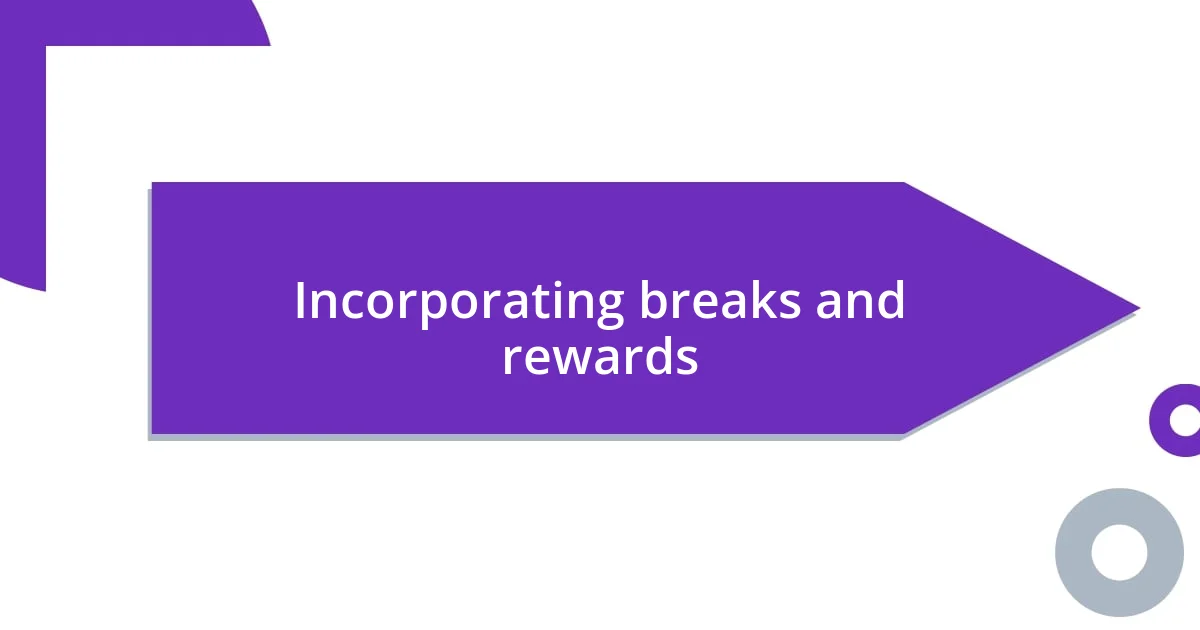
Incorporating breaks and rewards
Taking breaks is more than just time to recharge; it’s a crucial part of an effective study routine. I vividly recall an intense study session where I pushed through without pausing, only to find my focus slipping away. After about 90 minutes, my brain felt like mush. Now, I intentionally incorporate short breaks into my schedule, often using the Pomodoro technique. I study for 25 minutes, then treat myself to a 5-minute walk or some stretching. It’s incredible how stepping away for just a few minutes can refresh my mind and boost my productivity. Have you ever felt the weight of lengthy study sessions crushing your motivation?
I can’t stress enough the importance of rewards in staying motivated. When I complete a challenging chapter or grasp a difficult concept, I treat myself to something small but enjoyable—like a square of dark chocolate or an episode of my favorite show. Those little incentives keep me driven and make the grind feel worthwhile. I remember finishing a particularly dense topic and indulging in a cozy blanket and a movie night. It made the effort feel appreciated and helped solidify my learning experience. What sort of rewards motivate you?
Incorporating breaks and rewards not only enhances my focus but also turns studying from a chore into a fulfilling part of my day. Celebrating small victories through these rewards keeps my spirits high. I’ve learned that creating a balance between work and play keeps my brain engaged without feeling overwhelmed. Reflecting on my earlier experiences, I wish I had embraced breaks and treats sooner. Have you found a way to reward your hard work? Keeping it personal and enjoyable has made all the difference in my study routine.
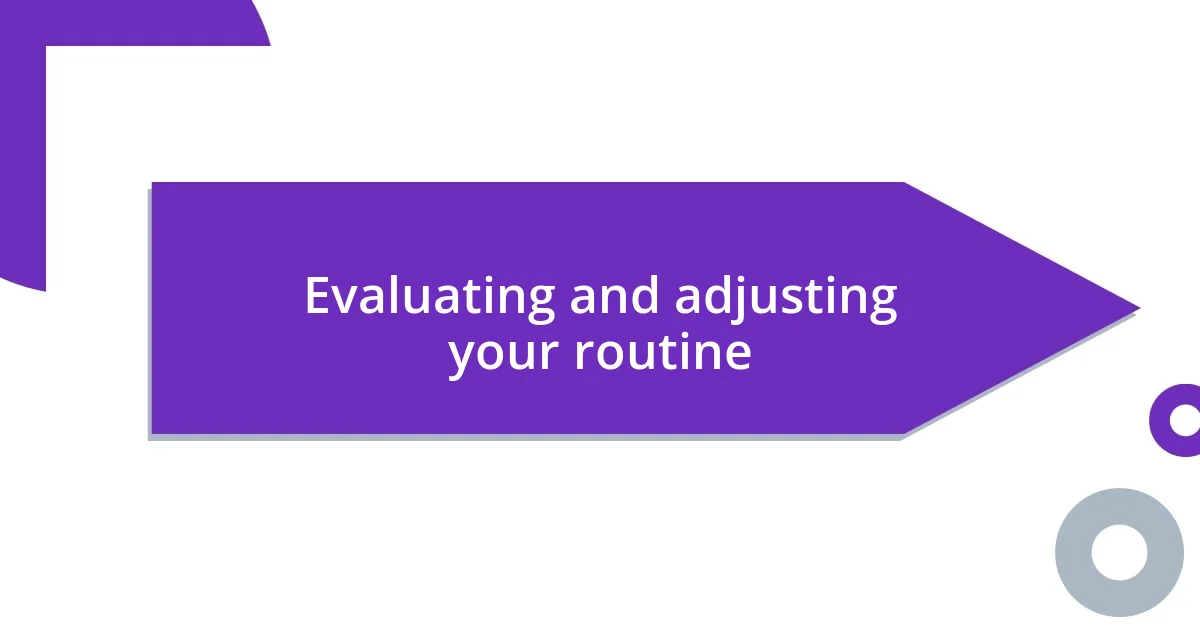
Evaluating and adjusting your routine
Evaluating and adjusting my study routine has become a crucial aspect of my learning journey. I remember the days when I stubbornly stuck to a rigid schedule, convinced it was the best approach. However, I quickly realized that not every day felt the same, and some days required more flexibility. Incorporating regular self-reflection allowed me to identify when I was most productive and when I needed to shift my focus. Have you ever felt like your routine just wasn’t working for you? When I finally acknowledged these feelings, I was able to make adjustments that genuinely supported my needs.
One particular instance stands out to me—midway through a course, I noticed my motivation waning despite following my set schedule. After some soul-searching, I realized I was overloading myself with material that didn’t captivate me any longer. I decided to switch up my study topics, alternating between subjects that excited me and more challenging ones. This adjustment provided a refreshing change and reignited my enthusiasm. Have you found yourself feeling stagnant in your studies, too? Allowing myself to embrace this shift ultimately made my routine more enjoyable and effective.
Adjusting my routine isn’t just about changing time slots or subjects; it’s about tuning into my emotional state as well. If I’m feeling drained or overwhelmed, I give myself permission to take a step back. One time, I noticed I was too foggy to concentrate after a long week. Instead of forcing myself to study, I took that evening for a leisurely walk with a friend. That break helped me return to my studies with renewed vigor. Listening to my feelings and being willing to adapt—have you explored how your emotions affect your productivity? Embracing this fluid approach has transformed my study routine from a chore into a dynamic part of my life that truly reflects my evolving self.












